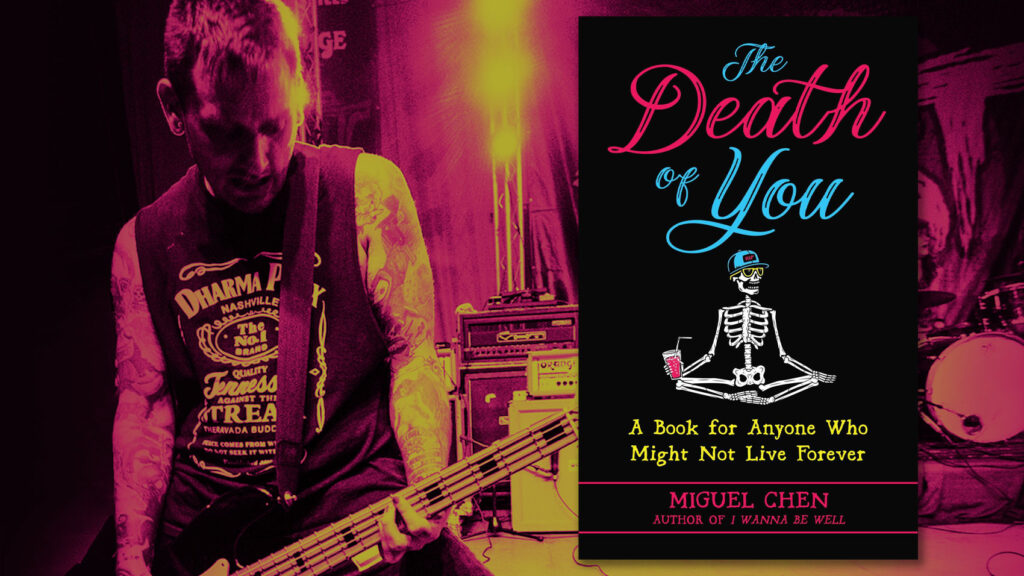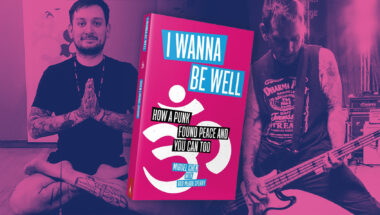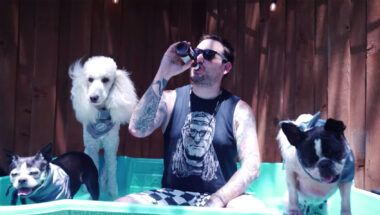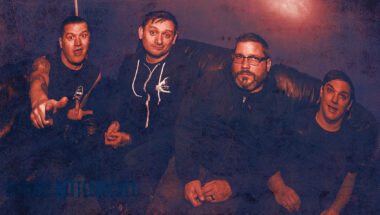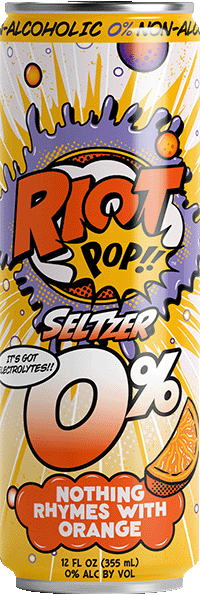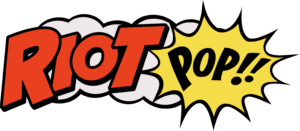Miguel Chen, bass player for punk band Teenage Bottlerocket, is continuing to make noise as a yogi and accomplished author. I last met with Chen when we chatted about his first book, I Wanna Be Well: How A Punk Found Peace And You Can Too. At the end of the interview, Chen mentioned to me that he was working on a second book focused on processing death and loss. Just over a year later, it’s here: The Death Of You: A Book For Anyone Who Might Not Live Forever.
Maybe you’re interested in this book because you’re dealing with the death of a loved one. Maybe you’ve never experienced loss. Whatever your reason, The Death Of You is a great place to start. Death isn’t an easy subject for most, with Chen having been eye to eye with death more often than many. When he was only sixteen, Chen lost his mother to cancer; shortly after, he lost his sister in a tragic car accident. In 2015, he lost his best friend Brandon Carlisle of Teenage Bottlerocket.
He’s grieved in many ways: sometimes with anger, sometimes recklessly, sometimes by self-medicating. It took a lot of soul-searching for Chen, looking inward to finally get to a place where he could be honest with himself. “Because of what happened and when it happened, I was able to live a more free existence,” he remarked. “It freed me up to be like, ‘Well, this happened, and this is real, so what am I going to do with the time that I do have?’ It really drove me to pursue the band and music, and to make a life for myself that I was happy with.”
Miguel Chen wants you to suffer less and live more, and that’s why he wrote this book. Together, you’ll look at a vast variety of death situations, including your own, and dissect them until they become understandable. Like How a Punk Found Peace, The Death of You also offers meditative practices throughout. Some of these practices might not be something you’ll want to jump right into, and that’s okay—ultimately, Chen wants everyone to go at their own pace and procure their own practice. Let’s talk death, so we can all live freely.
RIOT FEST: With your first book, you talk about living more mindfully through meditation. How do you feel the practices you discussed in I Want To Be Well differ from the ones in The Death Of You?
MIGUEL CHEN: I think of the first book as a blanket foundation—there’s some pretty simple stuff you can throw into your life if you want to. Then the second book is… obviously it’s a lot more specific. It’s about death and this big awful cloud moving over us. I think I Want To Be Well and those practices are more, “Here’s some things you can implement daily, and it’s not going to disrupt your life a whole lot if anything is going to seamlessly integrate into your day.”
The practices, I think, in The Death Of You are more like… I don’t perceive myself or anyone else doing these big elaborate death meditations, imagining yourself rotting on a daily basis. It’s more seasonal in my own life. When there’s been a death in my life, that’s when I come to these types of practices more often. Sort of like healing from a recent event, or if I’m feeling anxiety particular to those subjects, where a simple mindfulness practice or just a sitting meditation, I think that’s what we should all be doing everyday.
Do you feel like if someone was to jump into The Death Of You before they read I Want To Be Well, they might be a little overwhelmed?
I think it’s, again, maybe a little bit of where are they in their lives. If it’s someone with a sick family member who they know is going to pass away soon, or if someone who just recently experienced a loss—in those situations, there is a need that forces you to be open enough that I think they could read The Death Of You first and probably get something. Right?
Right.
But if it’s someone who death is really far from their mind, maybe baby steps. Maybe [read] I Want To Be Well first to not totally freak people out. Right?
Yeah. I would say, for me, I think about death pretty often— mostly with dogs, but with my dog especially or my death. I haven’t really been surrounded with losing someone very close to me. I found it so comforting the way that you’re able to approach the subject and talk about it in a way that doesn’t scare people away.
Yeah. If people are willing to walk in the front door in the first place, they’re going to find it’s a pretty comfortable place. So if someone is even willing to pick the book up and start reading it, they’ll probably be a bit more comfortable than they think they will be.
Obviously, grief and death have been pretty impactful in your life. Writing the book, did you feel any challenges from that while writing the book?
Yeah. I mean, for starters… I don’t know if it’s just because death was obviously on my mind while I’m writing this book, but I feel like a lot of fucking people I know died while I was writing that book. Like, every few chapters I’m like, “Oh man, my old buddy just committed suicide.” Or a guy I hadn’t talked to in a few years overdosed. It was so many… is this always happening, or am I just hyper-aware of it right now? I don’t want to be a cold person. Yeah, people die. Let’s move forward. The flip side with so many people dying all in such a small window is that you have to keep moving forward. I’m not even sure if I’m articulating that correctly.
It sounds like, almost in a way, writing the book was somewhat cathartic as you’re doing this.
Oh, absolutely. I think I find that a lot. The writing process for me… I look at it a few different ways. I look at it as an extension of my meditation practice. I think of it as this brain drain—like, whatever is in my head, just get it out. Just throw it on the paper, just to clear the head as much as possible, so the rest of my day I can be as present as possible.
And then the other way I look at it is, “What’s going on in my life right now?” Where does my own practice need a boost? Writing helps me to connect to that. I think when The Death Of You was born, it was as a seed of an idea for a book was around when Brandon [Carlisle] passed away. I think writing about it forced me to revisit these practices that I’d known and connect to it in a real way, which brings me a certain degree of healing in my own practice, right?
Right.
So the challenge is, maybe I have to do the things I’m writing about. Otherwise it’s just bullshit.
Reading the book brought me a little bit more in tune with friends and family, and paying closer attention to the side of things you talk about: living joyful and enjoying the time with them, but also realizing that a lot of people are losing people every single day. Was the concept of living joyful because of death something you had when you started the book? Or did that come about as you were writing it?
I think that came later in the process. I knew I needed to talk about death and I knew I needed to talk about healing, and that was the starting point. As a writer, you sort of discover where you’re going as you’re going there. I was reaching the end of the book, it became a little bit more apparent that we’re joyful because of death. When I started it, it was really, “How can we be joyful in spite of death?” By the end of it, it had transformed into [joy being] because of death in a lot of ways.
Even though I’d say I have a pretty healthy relationship with death—and I have for years—at the beginning of writing this book, and at the end of it, my relationship was definitely different.
You detail a lot of the emotions you’ve gone through with trying to understand death; you went through a lot of resent and rebellion and self-blaming. How did you personally learn how to handle grief differently?
It’s definitely a lot of trial and error.
I think when I was younger—especially as late teenager in the years immediately after my mom and my sister died—it was a lot of avoidance: drugs and party, party, party. If I’m not thinking about this or if I’m not feeling it, it’s not a real kind of mentality. Eventually time runs out on that sort of thing. Either it stops working and you have to try something else, or you die. By whatever stroke of luck or inspiration or whatever it was, I didn’t want to die. I also didn’t want to be miserable all the time. So it comes to saying, “Okay, this isn’t working. What do we do now?”
Sometimes you stop and admit to yourself, “I don’t have any fucking answers. I don’t know anymore.” Your only option is to sit and wait or see what comes your way. That’s when real answers start to present themselves right? When you stop trying to fix everything, the answers present themselves.
Right, and I think that is the hardest thing for so many of us to do. Like you said, I think the first urge in many situations—especially when you’re younger—is avoiding and avoiding until you can’t avoid it anymore. Then you have to sit down with it and figure it out.
Yeah. Even then it’s like, “Okay, avoiding is not working, let’s sit and let’s figure this out.” For most of life’s problems, if you sit and try to figure it out long enough, there’s something that you can do. Say you’re talking about financial problems—you try to avoid it, you’re using credit cards all the time, and you’re digging deeper into a hole. Eventually you’re like, “Okay, this isn’t working.” So you sit down. You budget, you figure out numbers, you work or whatever, and you come to a solution.
So when we’re talking about death, there is a degree of [feeling like] there is nothing you can do. You can sit around and try and figure it out, but there is just something about it—and about the human experience—that you can’t fix. So then what do you do?
I think that’s why it’s so scary for some people. There’s really no “fixing” things, and it’s just about what you talk about in the book: You have to come to the realization that there’s nothing you can do. You can make your life a little bit better today, so why don’t we do that?
Totally. The problem is never going to be fixed, but you can make it a little better—or at the very least, you can suffer a little less because of it.
The difference between sadness and suffering is such a fine line for most of us. It’s easy to fall into the depths of suffering if you let yourself.
Absolutely. I think a lot about all people—all humans—they are really connected by humane things. One is joy, and the other one is sadness. And, you know, there’s a plethora of other things. There’s anger and all this stuff, we all get angry, but we don’t necessarily need anger. But sadness and joy play these equal roles throughout the course of our lives. We need both of them, and there are good healthy ways to relate to both of them.
So for example, Joy: Everyone thinks it has to be this big exciting thing all the time, where with sadness people think it has to be this suffering, awful, debilitating thing all the time. I think that joy and sadness are the same in the way that we can be peaceful and feel either of those emotions. You can be really happy sitting quietly in a park, and it’s not particularly exciting, but there’s this peaceful joy inside of you. Or you can be going through the loss of your mother, but same thing, sitting somewhere quietly. Even though you’re deeply sad, there’s still a peace associated with it.
Yeah. I feel like I’ve felt those moments myself, it’s interesting. Like you said, there’s been times where feelings are sad but it’s peaceful, versus something sad becoming depression.
Absolutely.
How did you feel that your past experiences with death shaped who you are today—and if you could go back and see things the way you do now, or handle it differently, would you do it?
Had it not been for the death of my mom and my sister, my life very well could have taken a different path. I’m not sure I would have fully committed myself to a life of being in a punk rock band. I maybe would have played things a little bit safer—gone to college, looked for a good job, that kind of thing. I’m grateful for that part about it. It helped shape me in the sense that, “All right, this is going to be over. I better do something cool with it.”
As far as if I could go back and change anything… maybe I would have done less drugs, that kind of thing. I think about things that have a lasting effect. I learned a lot and I had a lot of fun, but I also had a lot of dark times. They’re here and there: I’ll just be sitting and have a weird chest pain or abdominal pain for no reason, then I’m like, “Oh yeah, that’s from all those years of absolutely punishing the fuck out of my body.” I could do without that. Maybe I wouldn’t have pierced my ears with a fork, that kind of stuff.
In all seriousness, it might have been nice to come to these practices that I think saved my life a little bit earlier. A little bit less of the suffering years—but the greater perspective is it happened when it could and when it needed to happen.
What are you hoping that your readers will get from reading the book?
In one sense, I hope that people get whatever they need from it. It’s the best I can hope for. But I hope there’s at least one or two people… not that I hope there’s people who are suffering, but I think about the deepest, saddest, darkest moments of my life and how I’ve been able to come out of that. I would hope that if there’s anyone in a similar place in their life, [The Death Of You] can spark a little bit of, “You can make your way out of this.”
The Death Of You is available now via Wisdom Publications. You can pick up a copy via Amazon here and subscribe to weekly articles from the Miguel Chen here.
